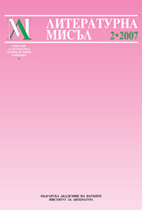Към генеалогия на сецесиона:
диалогът “Угасна слънце” – “Хаджи Димитър”: ерос и хтонос
Towards a Genealogy of Sezession:
The Dialogue “The Sun Dies Out” – “Hadji Dimitar”: Eros and Htonos
Author(s): Plamen AntovSubject(s): Literary Texts
Published by: Институт за литература - БАН
Keywords: literature; Sezession; eros; htonos; Botev; Yavorov
Summary/Abstract: The cardinal ambition of the text is to investigate the genetic commitment of the Modernism, and in particular of the Sezession poetics, with deep archetypical structures. The key role of Romanticism in this genealogy has been elucidated in detail, i.e. the transformation of myth folklore codes into literary ones. The problem is examined through a comparative reading of two poems, emblematic of Bulgarian poetry whose intertextual connection was established long ago – the romantic ballad “Hadji Dimitar” (1873) by the poet-revolutionary Hristo Botev and the poem “The Sun Dies Out” (1905), a sezession work by the most eminent representative of the early Modernism in Bulgaria Peyo Yavorov. The text studies the way in which Yavorov inherited and transformed not only the model of Botev, but – through it – the universal archaic archetype of the sacrificial heroic death in the middle of a monumental natural-cosmic chronotop. Beyond this archetype, the research restores the hidden presence of a second, more primitive one – about the battle of the hero against the chthonic female monster. In this way the “female” sex of the sezession Мonster in poem “The Sun Dies Out” has been determined, and its origin postulated through the folklore figure of the “samodiva” (wood nymph) in “Hadji Dimitar”. Some other problems are examined in parallel. The manifested “political modernity” of the national Romanticism in Botev is pointed out, his engagement with the actuality, with the topical and concrete conditions of the national Renaissance, as well as the “mental modernity” of Yavorov’s secession, which manifests itself, on the contrary, through a refusal of an external engagement with the political. This “mental modernity” has inherited,on another level, the absolute universalism of the archaic archetype. In such a way is substantiated the thesis of the regressive nature of the Modernism and the deeper “primitivism” of the modernist Yavorov in comparison with the romanticist Botev. This subject is situated in another, more particular, interpretative prospect. Through it has been traced – in a poetic-biographical aspect – the self-mythological potency of both poetic models – Botev’s and Yavorov’s.
Journal: Литературна мисъл
- Issue Year: 2007
- Issue No: 2
- Page Range: 32-62
- Page Count: 31
- Language: Bulgarian
- Content File-PDF

